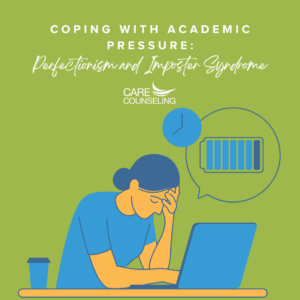Confronting Perfectionism and Impostor Syndrome
 The pursuit of higher education brings with it a host of challenges and opportunities for personal growth. While academics are a fundamental aspect of the college experience, they can also give rise to intense pressure, particularly in the forms of perfectionism and impostor syndrome.
The pursuit of higher education brings with it a host of challenges and opportunities for personal growth. While academics are a fundamental aspect of the college experience, they can also give rise to intense pressure, particularly in the forms of perfectionism and impostor syndrome.
Understanding Perfectionism
Perfectionism is a mindset characterized by setting unrealistically high standards and striving for flawless performance. While striving for excellence is admirable, perfectionism can lead to constant dissatisfaction, fear of failure, and heightened stress levels. The pressure to achieve unrealistically high standards can impede your overall well-being and hinder your ability to learn from mistakes and grow.
Combatting Perfectionism
1.Set Realistic Goals:
Aim for excellence but be realistic about what you can achieve within a given timeframe. Break down larger tasks into smaller, manageable steps to prevent feeling overwhelmed.
- Embrace Mistakes:
Recognize that making mistakes is a natural part of learning. Instead of dwelling on failure, focus on the lessons it provides for improvement.
- Practice Self-Compassion:
Treat yourself with kindness and understanding, just as you would a friend. Acknowledge your efforts and celebrate your progress.
- Prioritize Balance:
Avoid becoming consumed by academics. Allocate time for relaxation, hobbies, and spending time with friends and family to maintain a healthy work-life balance.
- Seek Feedback:
Instead of seeking validation through perfection, seek constructive feedback from professors and peers. Use their insights to refine your work and improve over time.
Unpacking Impostor Syndrome
Impostor syndrome refers to the belief that your accomplishments are the result of luck, rather than your skills and abilities. Despite evidence of your competence, individuals with impostor syndrome often doubt themselves and fear being exposed as a “fraud.” This mindset can hinder your confidence and prevent you from fully embracing your achievements.
Confronting Impostor Syndrome
1.Acknowledge Your Achievements:
Make a list of your accomplishments and the challenges you’ve overcome. Reflect on your growth and recognize that your successes are a result of your hard work.
- Normalize Self-Doubt:
Understand that self-doubt is a common experience, even among highly accomplished individuals. It doesn’t define your worth or abilities.
- Talk About It:
Share your feelings of impostor syndrome with friends, mentors, or counselors. Opening up about your experiences can provide perspective and alleviate the isolation.
- Change Negative Self-Talk:
Challenge negative thoughts by focusing on evidence that supports your capabilities. Replace self-critical thoughts with affirmations of your achievements.
- Celebrate Incremental Progress:
Recognize that success is a journey, not an instant destination. Celebrate small victories and milestones along the way.
Strategies for Coping
1.Mindfulness and Self-Care:
Engage in mindfulness practices, such as meditation or deep breathing, to manage stress and stay present. Prioritize self-care activities that nurture your mental and physical well-being.
- Time Management:
Develop effective time management skills to avoid procrastination and reduce last-minute stress. Create a study schedule that allows for breaks and leisure time.
- Seek Support:
Reach out to friends, family, or a counselor when you’re feeling overwhelmed. Discussing your challenges with others can provide valuable perspective and emotional support.
- Set Boundaries:
Establish boundaries to prevent burnout. Know when to say no to additional commitments that might exacerbate academic pressure.
- Focus on Learning:
Shift your focus from achieving perfect grades to genuinely understanding and learning from your coursework. Viewing education as a journey of growth can help alleviate pressure.
The college journey is marked by academic challenges, but it’s essential to recognize that you’re not alone in grappling with perfectionism and impostor syndrome. By understanding these challenges and implementing effective coping strategies, you can navigate academic pressure with resilience and a growth-oriented mindset. Embrace your achievements, practice self-compassion, and remember that your worth is not determined solely by your grades or accomplishments. As you learn to manage perfectionism and confront impostor syndrome, you’ll not only excel academically but also cultivate a stronger sense of self-worth and confidence that will serve you well beyond your college years.



























